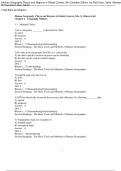Examen
Human Geography Places and Regions in Global Context 5th Canadian Edition By Paul Knox, Sallie Marston, Michael Imort, Alan Nash (Test Bank)
- Grado
- Institución
Human Geography Places and Regions in Global Context, 5th Canadian Edition. 5e Paul Knox, Sallie Marston, Michael Imort, Alan Nash (Test Bank) Human Geography Places and Regions in Global Context, 5th Canadian Edition. 5e Paul Knox, Sallie Marston, Michael Imort, Alan Nash (Test Bank)
[Mostrar más]



